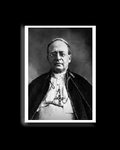By Hilaire Belloc
taken from The Crisis of Civilization
Usury, to take that first, like the greed from which it proceeds, is as old as human society. Like the other evils proceeding from the Reformation it was not created by the movement. We shall find in the case of Usury, as in the case of unbridled Competition (the force which, coupled with Usury, achieved the creation and enslavement of the proletariat), as likewise we have already found in the case of Contract replacing Status, that the seeds of the change had been sown long before the actual disruption of Christendom took place. What happened after the Reformation was not that these new evils, including Usury, then appeared for the first time but, as I have said, that they turned from exceptions into admitted and general habits. They were accepted, they grew, and at last came to cover the whole field of Society.
Unlike the transformation of Status into Contract and the undue growth of Competition, Usury was an evil in itself.
It was not only evil because it got out of proportion, and swelled beyond due measure, as did the replacement of Status by Contract and the practice of Competition, but was of its own nature a thing to be condemned and extirpated, if possible, as a disease. It may be remarked that it had already permeated like a mortal poison the society of pagan antiquity at its close and was one of the main evils under which the society of Graeco-Roman civilization collapsed in the West, and before the Mohammedan invasion of the East.(1)
The morals of the Church, when the Church gradually overcame the world and molded a new Europe, forbade Usury as strongly though not with so much practical effect, as did later Mohammedanism. Every sane philosophy, every religion, had forbidden it. The Greek pagan philosophers with Aristotle at their head denounced it; so did the Oriental pagans; so did the Jewish law.
Now why was this? Why was Usury thus regarded universally as immoral, and why has it been found in practice to be a poison ultimately destroying Society?
In order to answer these questions we must first understand what Usury is, in the sense in which we here employ the term; for there is great ambiguity in the use of the word and therefore misunderstanding of the thing which the word connotes.
Usury in the sense of an economic evil does not mean the taking of interest on a loan. It does not mean the taking of interest higher than some permitted minimum. It means that taking of interest upon a loan of money alone (or still worse, upon a mere promise to lend money, an instrument of credit) whether that money be invested soundly or no, whether it represent productive energy or no. Usury is, properly speaking, the taking of increment upon a loan of money merely because it is money, or worse still the taking of such increment upon a credit-instrument.
The reasons for condemning interest upon money alone, as distinguished from profit, are twofold: First, it is asking a tribute from Society as the price of releasing currency hitherto withheld from its proper function of acting as the circulating medium of exchange; secondly, it is arranging a claim for payment of a share in profit which may, but also may not, exist.
As an example of the first evil, let us consider a market in which the supply of currency is in the hands of a small number of those present, buyers and sellers; or even in the extreme case (the case of a bank in a small market town), in the hands of one controller only.
No transactions in the market, save those of mere barter, can take place unless the monopolist holding the currency permit it to be used for its natural purpose.
The natural purpose of currency is this: the facilitation of the multiple exchange of goods. If I have a surplus of wheat, having produced more than I can consume of that article, while my neighbor has a surplus of hay, having produced more than his establishment can consume, we will, if we are in contact, naturally exchange the hay for the wheat; since it is to the mutual advantage of both of us that we should do so.
Now let us suppose a third party, who had produced more potatoes than he can consume, but has not sufficient hay for his purpose; a fourth who has livestock for food in excess of his needs and would exchange the surplus for wheat; a fifth who is a craftsman and has produced clothes and boots for the supply of others in exchange for goods which he needs. Then there arises a condition not of simple barter but of multiple exchange.
The man with the hay is not in contact with the man who produced boots, nor either of them with the man who has the surplus of potatoes. There must be present a common medium of exchange which shall circulate among them if the various surpluses are to be distributed according to the demands of the producers and purchasers.
That is the true function of money, and of instruments of credit based upon money: to make possible the action of multiple exchange.
Now insofar as the monopolists hold back this current medium from general circulation, demanding a price for its use, they are demanding increment for something which has no natural increment: which does not breed. They are asking for a surplus although that which they advance produces of itself no surplus. Although that which they advance produces of itself no surplus. They are holding up the community by refusing it its normal medium of exchange.
That is the first wrong attaching to taking interest upon money alone. The second and in complex times such as ours, much the more important-evil attaching to usury is the taking of increment from a non-productive loan.
This is manifestly immoral.
A man comes to me and says: "I have found upon my property a vein of ore, but it lies deep, so that I shall require a considerable capital-say $100,000-to extract the valuable metal. That metal, when it shall have been extracted, will be worth at least $200,000. But I cannot obtain this advantage until I purchase the instruments for developing the mine and have hired the labor required to work it. Lend me the $100,000 necessary for the operation. I answer him: "If I do so, you must give me a share in the profit, say half of the total." He agrees, that without my capital he could not develop the mine; without his ore my capital would not be used. The combination of the two is productive of wealth, and we share that wealth. That is a perfectly moral transaction, even if the profit be one of 100 percent or 1000 percent over the original investment; so that if, with my stipulated half profit, I make 50 percent or 500 percent on my original loan, I am in now way to blame. The increment is not properly speaking interest on a loan of money: it is a share of real wealth.
But if I lend the money, saying; "I care not what your profits may be, nor whether there be a profit or no, but I demand $10,000 a year for the use of my $100,000"- then in case the speculation fails the borrower will be bound to pay the $10,000 perpetually, without any production of wealth to correspond to it. He will then be paying interest on an unproductive loan, and it is manifestly immoral to ask for share of wealth which does not exist.
Now, any loan at interest which is a loan of mere money may partake of this character; and among a number of such loans many will partake of this unproductive character. Of the money bearing interest merely because it is money, some large proportion at any one time must be demanding interest from activities which create no wealth out of which to pay the interest.
For instance, nearly all of the War loans issued in the belligerent countries to pay for the Great War [WWI] were loans unproductive of wealth, yet bearing interest. The money was expended, not in developing productive capacity not in turning potential wealth into actual wealth, but in feeding men occupied in killing each other, in clothing them, in giving them their wages, and armament. When the effort was over, a vast indebtedness remained; a vast annual interest was claimed in perpetuity- and yet there has been no wealth produced out of which such increment could come.
But though Usury is in itself immoral, and justly condemned by every ethical code, its chief and worst defect in the particular case we are now examining, the growth of Capitalism and its increasing proletariat, is the centralization of irresponsible control over the lives of men: the putting of power over the proletariat into the hands of a few who can direct the loans of currency and credit without which the proletariat could not be fed and clothed and maintained in work.
1. It must be remarked that one of the principal factors of success in the Mohammedan over-running of half Christendom between the 7th and 8th centuries was its active penalizing of Usury. This leading tenet of Islam in its social morals gave immediate relief to myriads of debtors in North Africa, Syria and Mesopotamia. It is strictly enforced today. Nothing is more remarkable in the Mohammedan countries of North Africa today than to see how, under the rule of Europeans there, the Mohammedan still refuses to take interest from his fellow Mohammedan on a mere loan of money, and how the whole trade of Usury is confined to the European immigrants and the native Jews.
















No comments:
Post a Comment